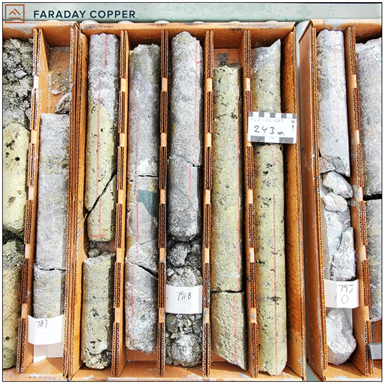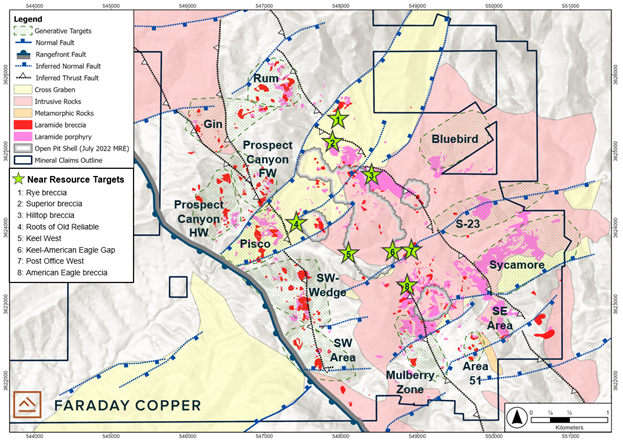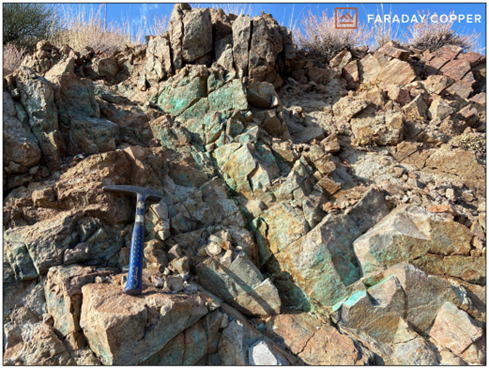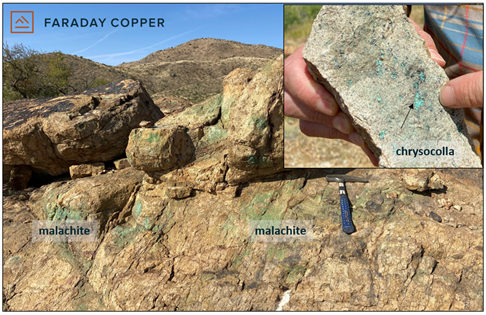VANCOUVER, BC / ACCESSWIRE / January 10, 2023 / Faraday Copper Corp. ("Faraday" or the "Company") (TSX:FDY)(OTCQX:CPPKF) is pleased to provide an exploration update at its Copper Creek project in Arizona, USA.
Highlights
- Commenced a 10,000-metre ("m") Phase II Drilling Program on October 30, 2022, with the objectives of expanding the mineral resource, delineating high-grade zones and testing new generative exploration targets.
- Drilling to date has intersected massive copper sulphide over approximately 15 m (from 234 m) as an extension to the Copper Prince breccia (Figure 1). Assay results are pending.
- Established a dedicated, generative team to focus on new discoveries outside of the Mineral Resource Estimate ("MRE").
- Identified twelve generative target areas outside of the MRE (Figure 2).
- Identified eight priority exploration targets in proximity to the MRE which have the potential to expand the mineral resource footprint (Figure 2).
- Over 400 breccia occurrences have been mapped at surface, of which 14 have been included in the MRE and a total of 35 have one or more drill holes in them. Breccias offer the potential to host high-grade, near-surface copper mineralization (Figures 3 and 4).
Thomas Bissig, VP Exploration, commented, "We are excited to initiate a generative exploration program at Copper Creek with the aim of making new discoveries in this under-explored district. The large number of previously untested breccia and porphyry occurrences offers significant exploration upside. As part of the Phase II Drill Program, we have initiated reconnaissance drilling on several regional targets as well as drill testing near-resource opportunities."

Figure 2: Structural model and target areas at the Copper Creek Project


Figure 4: Copper oxide mineralization exposed at the Rum breccia target at the Copper Creek Project

Generative Exploration Target Areas
A dedicated exploration team has been established to evaluate targets outside of the mineral resource area. Field work is ongoing including mapping, sampling and reconnaissance drilling. Additionally, a detailed review of previous geophysical data is underway to evaluate the collection of additional geophysical data as well as an airborne spectral survey.
A newly developed structural model (Figure 2) highlights that the hydrothermal breccias and porphyries follow two principal northwest trends. The eastern trend is interpreted to follow the main Holy Joe thrust fault and contains the breccias and porphyry mineralization included in the MRE. The western trend shows alteration characteristics consistent with a less deeply eroded part of the mineral system and is interpreted to follow a second order northwest striking thrust fault and remains under explored. High-grade breccia-hosted mineralization is known to occur in the southeastern extension of the western trend to the south of the Copper Creek Project, highlighting the prospectivity of this trend.
Following is a brief description of each exploration target area, as outlined in Figure 2. All results referenced below are available in the Faraday drilling database.
Rum and Gin Breccias
This target area, with dimensions of 1.5 km by 0.7 km, is located 1.3 km to the northwest and along strike from the mineral resource area in the hanging wall of the inferred Holy Joe thrust fault. The target area follows a northeast trending magnetic low that is coincident with a zone of sericite alteration and subtle northeast-trending Z‐Tipper Axis Electromagnetic ("ZTEM") geophysical conductivity anomaly. Topographically the target area occupies a bowl-shaped depression where more than 15 breccias with abundant iron oxide outcrop at surface. Copper oxide mineralization can be observed at surface near the Rum breccia (Figure 4). Two historic drillholes (RUM-1 and R-1-1X) intersected near-surface copper mineralization with grades of 1.07% over 48.8 m from surface and 0.82% over 27.4 m from 32 m.
Area 51
This target area is situated in the hanging wall of the inferred Holy Joe thrust fault's southeasterly continuation from the mineral resource area and covers an area of 250 m by 400 m. Surface geochemistry reveals several anomalous copper, molybdenum and bismuth values spatially associated with mapped breccia outcrops. The area straddles the boundary between magnetic highs and lows.
Mulberry Zone
This target area, with dimensions of 800 m by 400 m, is the southward continuation from known mineralization. It is on a magnetic low area explained by widespread sericite-clay alteration. Surface rock samples show strong copper anomalies in this area. Historical drilling was limited and includes three, near-vertical drill holes with isolated copper grades above 0.3% in drill hole NE-1.
SE Area
This target area is characterized by Proterozoic sedimentary rocks intruded by the Copper Creek batholith. Localized, structurally controlled copper oxide mineralization is exposed at surface. This area may be prospective for sedimentary rock-hosted mineralization. Historical drilling is limited in the area.
SW Area
Located northwest along strike from known mineralization to the south of Copper Creek, this area features several breccia outcrops with localized, but compelling, surface copper anomalies with 10 rock samples with 0.1% to >1% copper values. A Titan-24 Induced Polarization ("IP") geophysical survey identified a prominent chargeability anomaly approximately 200 m below surface. A single hole drilled nearby intersected 9 m to 14 m intervals of 0.28% to 0.54% copper, with individual samples up to 1.5% copper below 960 m depth in drill hole REX-10-046.
SW Wedge
This target area contains a high concentration of mapped breccias along a northwest structural trend and at intersections with northeast striking fractures. Some subtle surface copper anomalies along with a 300 m northwest oriented Versatile Time Domain Electromagnetic ("VTEM") anomaly are observed, whereas the target area lies at the southern margin of a prominent east-west ZTEM conductivity anomaly. Historical drilling is limited in the area.
Pisco
This target area is located immediately west of the mineral resource area and includes numerous breccias, some of which are tourmaline-rich and widespread sericite alteration is present in the area. Limited old mine workings are evident from waste piles. Historical drilling (REX-14-079) did not focus on the breccias but intercepted low-grade copper mineralization associated with early halo veins and weak potassic alteration in granodiorite porphyry.
Prospect Canyon Hanging Wall
This target area is located in the hanging wall of an interpreted secondary thrust fault paralleling the inferred Holy Joe thrust fault to the east. The area is characterized by elevated ZTEM conductivity response in the 250 m depth slice of the inversion model. Circular magnetic lows characterize the breccias, which is likely the result of the associated hydrothermal alteration.
Prospect Canyon Footwall
This target area is characterized by an abundance of breccias and porphyries apparently controlled by cross cutting structures. The target area is located in the footwall of a postulated secondary thrust fault paralleling the inferred Holy Joe thrust fault to the east. Anomalous copper occurs in some targeted vein samples. The area is a magnetic low in a northwest trend which coincides with clay-sericite alteration.
Bluebird
This target area is named after the historical Bluebird mine which exploited vein-hosted polymetallic silver-copper-zinc-lead mineralization and is located in the footwall of the inferred Holy Joe thrust fault. East to northeast trending veins including early halo veins crosscut granodiorite. Surface geochemistry includes some of the highest-grade copper rock samples, but these appear to be restricted to narrow veins and limited alteration. Breccias are rare in this area.
S-23 and Sycamore
These two target areas have similar characteristics, and both locate in the footwall of the inferred Holy Joe thrust fault to the southeast of Bluebird. Northeast trending veins are common but only limited surface geochemical anomalies are associated with early halo veins. Similar to the Bluebird area, breccias are rare in this area. Historical drilling did not intersect significant mineralization, but drill holes were largely vertical and not designed to intersect northeast trending vein zones.
West Expansion of Keel
A prominent ZTEM conductivity anomaly extends from the American Eagle area westward. There is currently no adequate drill coverage testing the westward extension of the ZTEM conductivity anomaly at depth. Phase I drill hole FCD-22-007 (included in the news release dated October 18, 2022) intersected high-grade mineralization in the western part of Keel, highlighting the potential for mineral resource expansion to the west.
Gap between Keel and American Eagle
Keel and American Eagle currently form two separate underground resource footprints. This appears, in part, to be the result of limited drilling between the two areas. Intersecting high-grade copper mineralization has the potential to link the underground mineralization into a single continuous footprint.
Roots of Old Reliable
The Old Reliable breccia is hosted in Glory Hole volcanics near the intrusive contact to the Copper Creek batholith. Drilling is densely spaced, focused on the breccia, but is limited to about 230 m below surface. The westward dipping contact of the volcanics with the intrusion is a zone of weakness along which mineralization may have been focused. This area has not been drill-tested and provides a compelling target for high-grade breccia or porphyry-hosted mineralization below Old Reliable.
Hilltop Breccia
The Hilltop breccia measures 90 m by 50 m in surface exposure and crops out at the top of a hill immediately northeast of the mineral resource area. Copper oxide mineralization is present at surface (Figure 3). A near-vertical, historical drill hole was collared approximately 50 m east of the Hilltop breccia and intersected 15.24 m of 0.25% copper from 3 m in drill hole CC-02. The Hilltop breccia has never been drilled.
Superior Breccia
Three historical drill holes (S-1, S-2 and S-3) targeted this prominent breccia outcrop approximately 400 m northwest of the Copper Giant breccia. The drill holes intersected narrow zones of breccia but did intercept porphyry with D-type veins and sericite alteration. Only one of those holes (S-1) has geochemical data but no significant copper was intercepted. The geometry of the Superior Breccia remains to be defined at depth.
Rye Breccia
The Rye breccia includes several breccia outcrops approximately 300 m north of the Superior breccia. These breccias have never been drilled but feature compelling geochemical anomalies at surface with 12 rock samples ranging from 0.1% to 6.5% copper.
Post Office West Breccia
The Post Office breccia has one historic drill hole (PO-1R) with marginal copper grades. Two additional breccias are mapped 100 m and 200 m to the southwest of the Post Office breccia and only one of those has a drill hole (HN-8). This hole was drilled vertically and intercepted approximately 60 m of 0.3% to 0.5% copper from 44 m.
American Eagle Breccia
The American Eagle breccia was the site of small-scale historical mining. The breccia geometry is not well-understood due to the limited drilling compared to other breccias. Copper grades are variable and currently not consistent enough to have this area included in an open pit mineral resource.
Phase II Drill Program
The Copper Creek Phase II Drill Program was initiated on October 30, 2022 with 10,000 m of planned drilling. The program objectives include:
- Commencing reconnaissance drilling on new targets outside of the MRE;
- Expanding the MRE; and
- Better delineating high-grade mineralized zones.
Geological mapping and collection of field data has been initiated and will guide the drilling program. Approximately 20% of the Phase II drilling will be aimed at newly identified target areas.
Qualified Person
The scientific and technical information contained in this news release has been reviewed and approved by Faraday's VP Exploration, Dr. Thomas Bissig, P. Geo., who is a Qualified Person under National Instrument 43-101 - Standards of Disclosure for Mineral Projects ("NI 43-101").
About Faraday Copper
Faraday Copper is a Canadian exploration company focused on advancing its flagship copper project in The United States of America. The Copper Creek project, located in Arizona, is one of the largest undeveloped copper projects in North America with open pit and bulk underground mining potential. The Company is well-funded to deliver on its key milestones and benefits from a management team and board of directors with senior mining company experience and expertise. Faraday trades on the TSX under the symbol "FDY".
For additional information please contact:
Stacey Pavlova, CFA
Vice President, Investor Relations & Communications
Faraday Copper Corp.
E-mail: info@faradaycopper.com
Website: www.faradaycopper.com
To receive news releases by e-mail, please register using the Faraday website at www.faradaycopper.com.
Cautionary Note on Forward Looking Statements
Some of the statements in this news release, other than statements of historical fact, are "forward-looking statements" and are based on the opinions and estimates of management as of the date such statements are made and are necessarily based on estimates and assumptions that are inherently subject to known and unknown risks, uncertainties and other factors that may cause actual results, level of activity, performance or achievements of Faraday to be materially different from those expressed or implied by such forward-looking statements. Such forward-looking statements and forward-looking information specifically include, but are not limited to, statements concerning the future drilling of the Copper Creek property, the exploration potential of the Copper Creek property, and the expected timing for and scope of the Company's drilling programs at Copper Creek.
Although Faraday believes the expectations expressed in such forward-looking statements are based on reasonable assumptions, such statements should not be in any way construed as guarantees of future performance and actual results or developments may differ materially. Accordingly, readers should not place undue reliance on forward-looking statements or information.
Factors that could cause actual results to differ materially from those in forward-looking statements include without limitation: market prices for metals; the conclusions of detailed feasibility and technical analyses; lower than expected grades and quantities of mineral resources; receipt of regulatory approval; receipt of shareholder approval; mining rates and recovery rates; significant capital requirements; price volatility in the spot and forward markets for commodities; fluctuations in rates of exchange; taxation; controls, regulations and political or economic developments in the countries in which Faraday does or may carry on business; the speculative nature of mineral exploration and development, competition; loss of key employees; rising costs of labour, supplies, fuel and equipment; actual results of current exploration or reclamation activities; accidents; labour disputes; defective title to mineral claims or property or contests over claims to mineral properties; unexpected delays and costs inherent to consulting and accommodating rights of Indigenous peoples and other groups; risks, uncertainties and unanticipated delays associated with obtaining and maintaining necessary licenses, permits and authorizations and complying with permitting requirements, including those associated with the Copper Creek property; and uncertainties with respect to any future acquisitions by Faraday. In addition, there are risks and hazards associated with the business of mineral exploration, development and mining, including environmental events and hazards, industrial accidents, unusual or unexpected formations, pressures, cave-ins, flooding and the risk of inadequate insurance or inability to obtain insurance to cover these risks as well as "Risk Factors" included in Faraday's disclosure documents filed on and available at www.sedar.com.
This press release does not constitute an offer to sell or a solicitation of an offer to buy any securities in any jurisdiction to any person to whom it is unlawful to make such an offer or solicitation in such jurisdiction. This press release is not, and under no circumstances is to be construed as, a prospectus, an offering memorandum, an advertisement or a public offering of securities in Faraday in Canada, the United States or any other jurisdiction. No securities commission or similar authority in Canada or in the United States has reviewed or in any way passed upon this press release, and any representation to the contrary is an offence.
SOURCE: Faraday Copper Corp.
View source version on accesswire.com:
https://www.accesswire.com/734616/Faraday-Copper-Intersects-Massive-Copper-Sulphide-and-Provides-Exploration-Update-at-the-Copper-Creek-Project-in-Arizona
